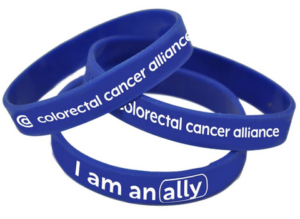March is Colorectal Cancer Awareness Month; Kentucky has the nation’s fourth highest rate of death from colon cancer

By Natalie Pitman
University of Kentucky
In March, we wear blue to recognize Colorectal Cancer Awareness Month, first observed in March 2000. Since then, it has become an opportunity to spread awareness about the importance of screening and honor those diagnosed with colorectal cancer.
Excluding skin cancers, colorectal cancer is the third most common cancer diagnosed in both men and women. It’s estimated that 106,590 new cases of colon cancer and 46,220 new cases of rectal cancer will be diagnosed in 2024. Kentucky has the fourth highest rate of death from colon cancer in the nation.
“The good news is colorectal cancer is easier to prevent than most other cancers and is highly treatable. It is often curable when caught early, and we could dramatically reduce complications from this disease by getting more people screened,” says Darwin Conwell, M.D., UK HealthCare medical pancreatologist and Jack M. Gill Endowed Chair in Internal Medicine at the UK College of Medicine.
 Let’s talk about the importance of colorectal cancer screenings and why they should be a priority for everyone.
Let’s talk about the importance of colorectal cancer screenings and why they should be a priority for everyone.
What is colon cancer? The colon and rectum are parts of the digestive system. Colorectal cancer begins when cells that are not normal grow inside the colon or rectum. Early symptoms may be subtle, making regular screenings crucial for early detection.
Who should get screened? Most people should begin getting screened at age 45. You may need to begin screening earlier. Talk with your provider if you or a close relative has had colon polyps or colon cancer, or if you have an inflammatory bowel disease.
What are the different screenings? Screenings play a pivotal role in catching abnormalities before they turn cancerous. Detecting and removing polyps during screenings significantly reduces the risk of colorectal cancer.
There are different tests to detect colorectal cancer. For most people, the best test is the one they can complete. Talk with your primary-care provider about which test is right for you. More information is provided below or click on this link for a flyer.
UK HealthCare offers three types of colorectal cancer screening tests:
- Colonoscopy: The provider performing the screening can see and remove growths (polyps) in the colon and rectum during this test to prevent or detect colorectal cancer. You will need to take off work the day of the procedure. Some patients who take off the day before the procedure as well to complete bowel preparation. If a polyp is detected, it can be removed during the procedure. Screening is conducted every 10 years if results are normal.
- Cologuard: Your healthcare provider will order the Cologuard test to screen for colorectal cancer. Cologuard can be completed at home and is designed to detect abnormal cells in your stool. After you collect the sample, follow the Cologuard instructions to mail the sample to a lab. Results are sent to you and your provider. Screening is conducted every three years if results are normal.
- FIT Tests: The provider will test your stool sample for blood, by ordering a FIT test. You can complete the FIT test at home. Screening should be completed every year if results are normal.
A positive Cologuard or FIT test result is not the same as a cancer diagnosis, so please talk to your health care or telehealth provider for next steps.
“Colonoscopies are considered the gold standard for colorectal cancer screening, but stool-based tests like Cologuard or FIT tests can be a more accessible option if work, transportation, or family obligations are preventing you from getting a colonoscopy,” said Dr. Avinash Bhakta, a UK Markey Cancer Center colorectal surgeon. “Regardless of the test you choose, the most important thing you can do is get screened regularly.”
Screening can help detect early signs and help monitor situations that can increase your risk of developing colorectal cancer. Getting screened for colorectal cancer is one of the most important ways you can take charge of your health.